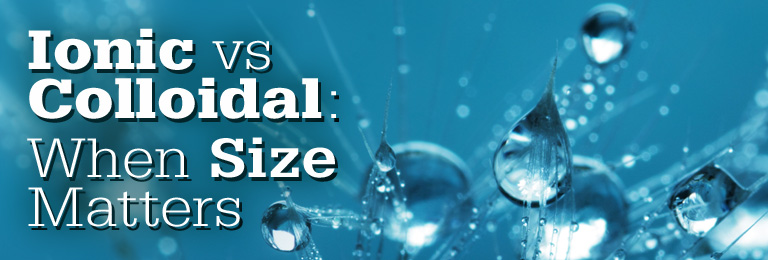Ionic vs. Colloidal: When Size Matters
Ionic vs Colloidal? Is there a difference? Which is better and why? When choosing the best mineral supplements, it is important to know which format your body can get the most benefit from.

The question of “Which is better, ionic or colloidal?” is frequently asked. Simply put it is a question of size. When it comes to mineral supplements, particle size is pivotal to absorption and utilization.
Ionic vs Colloidal: The Importance of Mineral Size
Minerals are not of much use unless they can be absorbed so that the body’s cells can have access to them. Your body needs minerals to carry out the many body processes necessary for life. Growth, repair, energy, and muscle and nerve function are just a few of these important processes. Minerals are naturally occurring inorganic solids. Rocks are usually composed of a blend of many minerals bound together in aggregates. These rocks are broken down over time through various processes into mineral-rich soil.
Too Large to Use: Inorganic Minerals are Colloidal
But the minerals found in soil are colloidal. Colloidal particles are not water-soluble and are too large in size to be usable to the body. So how can we access these minerals? We can’t just eat a handful of dirt…but plants can! In nature, plants pull these large inorganic mineral particles from the soil and break them down into a much smaller water-soluble form. Through the process of photosynthesis, these large colloidal mineral particle are transformed into a format that can be used to help the plant grow and thrive. Humans (and animals) can then make use of these transformed minerals by eating the mineral-enriched plants.
Water Soluble: Ionic Minerals are Able to Bond
Modern technology allows us to do what only plants could do in the past. We can take these large inorganic colloidal mineral particles and break them down into extremely small ionic water-soluble particles which can be easily absorbed and assimilated fully by the body’s cells. The term “ionic” is used to describe mineral supplements in a water-soluble format. An ion by definition is a charged particle – meaning that the particle carries either a positive or negative charge that allows it to bond and interact with other charged particles. Unlike colloidal particles, which are merely floating in suspension between water molecules, ionic minerals are actually bonded with water molecules due to their charged nature.
Size Matters: Digestion and Absorbtion
Ionic water-soluble minerals are a very small particle size known as an angstrom. An angstrom is one millionth of a meter, which is about 10,000 times smaller than colloidal particles. This extremely small size gives these supplements a distinct advantage over colloidal minerals, as well as supplements in pill or capsule format.
The small particle size, coupled with the ionic charge, allows these minerals to be easily absorbed directly into the body’s cells without the need to be digested. This means that the body can quickly and readily make use of these minerals without first having to wait for them to be broken down into a smaller absorbable form. The small size not only allows these minerals easy entry into cells, but also allows any excess to easily leave the body as well.
Colloidal minerals, due to their larger particle size, can actually become trapped in the body and cause toxic buildup if they cannot be flushed from the system, leading to conditions such as kidney stones, bone spurs, and heavy-metal poisoning.
Ionic Mineral Supplements Are Best
Water soluble liquid ionic minerals are of major benefit to those with reduced digestive or enzymatic function, such as the elderly and those with serious health conditions, because they can be absorbed without the need for digestion. Plus they are easy to swallow, which is a major plus for children, pets, and those with swallowing difficulties.
So, when it comes to mineral supplements, size does matter.
Ionic vs Colloidal Research Sources
• What Are Minerals?
• The Great “Liquid vs. Pill” Controversy
• Colloids
• Essense of Life Minerals Health Topic
Share This Article With Someone You Know
This article is copyright ©2017 Essense of Life, LLC. All rights reserved. Do not copy without permission.
This information is not medical advice and is certainly not intended to replace the advice or attention of your personal physician or other healthcare professional. Therefore, consult your doctor or healthcare professional before making any changes to your diet or starting a supplement program.
Clear water drops image courtesy Pexels.com



Facebook Comments